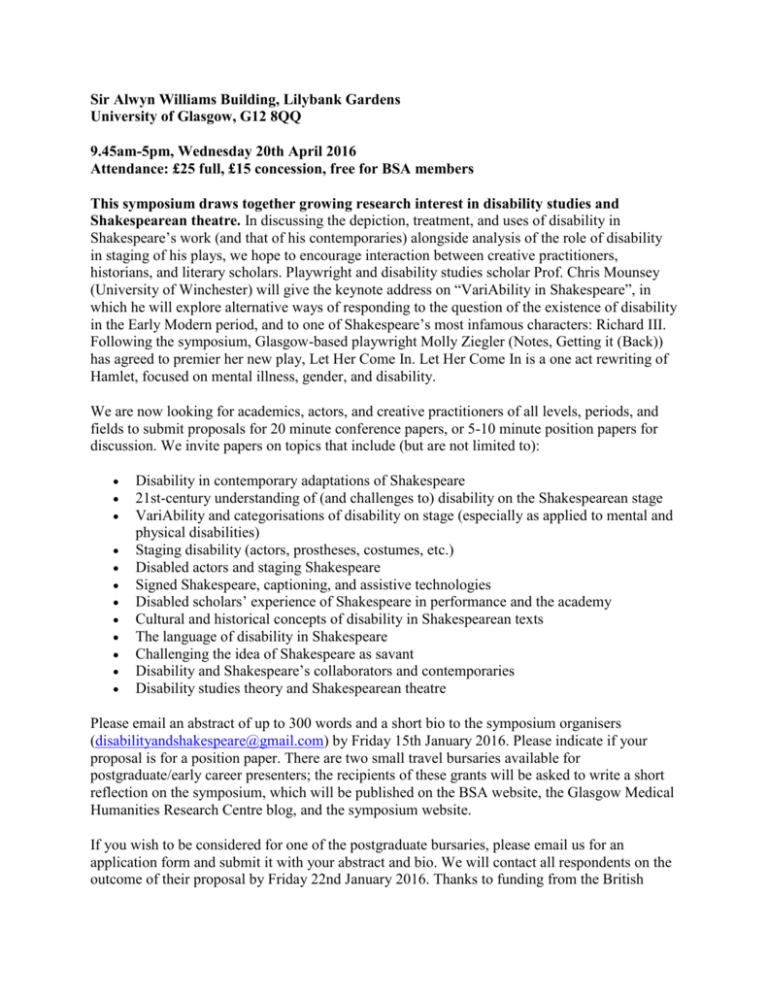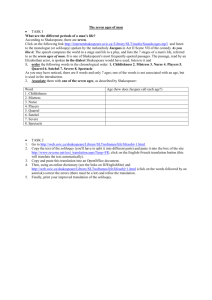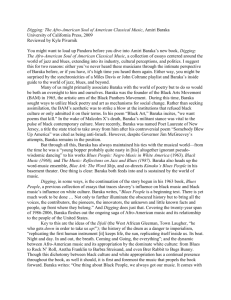full text
advertisement

Sir Alwyn Williams Building, Lilybank Gardens University of Glasgow, G12 8QQ 9.45am-5pm, Wednesday 20th April 2016 Attendance: £25 full, £15 concession, free for BSA members This symposium draws together growing research interest in disability studies and Shakespearean theatre. In discussing the depiction, treatment, and uses of disability in Shakespeare’s work (and that of his contemporaries) alongside analysis of the role of disability in staging of his plays, we hope to encourage interaction between creative practitioners, historians, and literary scholars. Playwright and disability studies scholar Prof. Chris Mounsey (University of Winchester) will give the keynote address on “VariAbility in Shakespeare”, in which he will explore alternative ways of responding to the question of the existence of disability in the Early Modern period, and to one of Shakespeare’s most infamous characters: Richard III. Following the symposium, Glasgow-based playwright Molly Ziegler (Notes, Getting it (Back)) has agreed to premier her new play, Let Her Come In. Let Her Come In is a one act rewriting of Hamlet, focused on mental illness, gender, and disability. We are now looking for academics, actors, and creative practitioners of all levels, periods, and fields to submit proposals for 20 minute conference papers, or 5-10 minute position papers for discussion. We invite papers on topics that include (but are not limited to): Disability in contemporary adaptations of Shakespeare 21st-century understanding of (and challenges to) disability on the Shakespearean stage VariAbility and categorisations of disability on stage (especially as applied to mental and physical disabilities) Staging disability (actors, prostheses, costumes, etc.) Disabled actors and staging Shakespeare Signed Shakespeare, captioning, and assistive technologies Disabled scholars’ experience of Shakespeare in performance and the academy Cultural and historical concepts of disability in Shakespearean texts The language of disability in Shakespeare Challenging the idea of Shakespeare as savant Disability and Shakespeare’s collaborators and contemporaries Disability studies theory and Shakespearean theatre Please email an abstract of up to 300 words and a short bio to the symposium organisers (disabilityandshakespeare@gmail.com) by Friday 15th January 2016. Please indicate if your proposal is for a position paper. There are two small travel bursaries available for postgraduate/early career presenters; the recipients of these grants will be asked to write a short reflection on the symposium, which will be published on the BSA website, the Glasgow Medical Humanities Research Centre blog, and the symposium website. If you wish to be considered for one of the postgraduate bursaries, please email us for an application form and submit it with your abstract and bio. We will contact all respondents on the outcome of their proposal by Friday 22nd January 2016. Thanks to funding from the British Shakespeare Association, this symposium will be free to attend for BSA members. Symposium attendees are welcome to join the BSA in advance of the event or on the day. The symposium venue, the Sir Alwyn Williams Building, is fully accessible, and the symposium will include accommodations such as pre-circulated papers and discussion topics, ending with an interactive roundtable discussion. For more information on access, transport, and the venue please visit our website. If you have any questions, please email the symposium team at disabilityandshakespeare@gmail.com, or contact us via @Disability&SS. CALL FOR PAPERS Special Issue of Christianity & Literature “GEORGE HERBERT AND RELIGION” Issue Editor: Gary Kuchar University of Victoria Christianity and Literature seeks essays for a special issue on George Herbert and Religion. Ideal submissions offer nuanced discussions of Herbert’s writing informed by his religious culture. Essays on the following topics will be especially welcome: - Herbert and medieval traditions - Herbert's reception history, both poetic and religious (up to and including the 21st-century) - Herbert and puritanism - Herbert and the New Testament - Herbert and post-revisionist historiography - Herbert and historical-phenomenology or other new approaches to Herbert - Herbert and theory of the lyric. Please email submissions of 6,000-9,000 words to cal@apu.edu by June 15, 2016. The call for submissions will remain open until the issue is filled. You may direct questions and inquiries to Gary Kuchar (Special Issue Editor) and Matthew Smith (CAL Associate Editor) at cal@apu.edu. Christianity & Literature is a peer-reviewed journal published by SAGE. Margaret Atwood Society Awards are named each year; nominations are invited in all categories and should be sent directly to the appropriate judge (see below). Entries for the 2015 Awards are due by December 1st, 2015. Winners will be notified in early January. (Emailed entries should be in .docx or .pdf.) Best Undergraduate Essay: Mairin Barney, embarney@roosevelt.edu Best Graduate Student Essay (or chapter): Lauren Rule Maxwell, lauren.maxwell@citadel.edu Best Article: Dunja Mohr, dunja.mohr@uni-erfurt.de Best Edited Collection: Sarah Petrovic, Oklahoma Wesleyan University, 2201 Silver Lake Rd, Bartlesville, OK, 74006 Best Book: Karma Waltonen, UWP (Voorhies Hall), UC Davis, One Shields Avenue, Davis, CA, 95616 “Portals, Gates”: The Classics in Modernist Translation As Steven Yao observes in *Translation and the Languages of Modernism,* both the practice and the idea of translation were integral to experimental early twentieth-century modernist work in English: “feats of translation not only accompanied and helped to give rise to, but sometimes even themselves constituted, some of the most significant Modernist literary achievements in English.” And in their translation work, many anglophone modernists were especially responsive to the literature of Ancient Greece and Rome. As H.D. would note of the work of Euripides, whose plays she translated, “these words are to me portals, gates.” Modernists Ezra Pound, H.D., W.B. Yeats and E.E. Cummings—among others—pursued translations of work from dramatists and poets such as Aeschylus, Euripides, Sophocles, Homer, Sappho, Meleager, Theocritus, Catullus, Horace, Ovid, and Propertius. In some cases they developed more traditional translations, aimed to render in English a text from another language, culture, and time; in other instances, they ventured more maverick translations, often construed by contemporary reception studies as adaptations or interventions (which sometimes incurred the ire of early twentieth-century scholarship). For many modernists, such translation work not only served as “good training”—as Pound phrased it—but also contributed to the enrichment of English beyond its ordinary boundaries, allowing fine-grained and radical access to the aesthetic and intellectual wisdom of a corpus of ancient literature they saw as valuable to the present. Many even used the concept of translation (the word’s etymology suggests “carrying across”) to capture a broader modernist commitment to bringing over to the early twentieth-century resources of the ancient past, its cultural archive — to speak to questions, conceptual nodes and problematics of the contemporary moment. Situated at the intersection of Classical studies, Modernist studies, and Translation studies, this conference invites commentary on the work of early twentieth-century modernist “translation,” broadly interpreted – responses by modernist writers to texts and cultural materials from the Classical world. With this conference, we seek to redress a gap in Classical reception studies, which to date engages little early twentieth-century work. We welcome papers, performances, and creative or multimedia work addressing --more traditional translation work, such as work for the Poets’ Translation Series edited by Richard Aldington, Yeats’s *King Oedipus* and *Oedipus at Colonus,* and Louis MacNeice’s *Agamemnon*; --more experimental translation work by modernists such as Pound (e.g. *Homage to Sextus Propertius,* *Women of Trachis*) and H.D. (e.g. *Hippolytus Temporizes,* *Ion*); --freer appropriations and adaptations of Classical material, such as H.D.’s responses to Sappho and Meleager; Pound’s and Joyce’s engagements with the Odyssey; Pound’s and H.D.’s work with the Eleusinian mysteries; and Cummings’s experiments with Catullus, Homer, and Greek myth. Please send 250-word abstracts, along with current cv, to miranda.hickman@mcgill.ca and lynn.kozak@mcgill.ca by January 10, 2016. The conference will take place in Montréal, Québec, Canada, April 30 and May 1, 2016. Miranda Hickman Department of English McGill University Lynn Kozak Department of English McGill University CALL FOR PAPERS Amiri Baraka Society American Literature Association 25th Annual Conference May 26-29, 2016 Hyatt Regency San Francisco 5 Embarcadero San Francisco, CA The Amiri Baraka Society invites abstracts (of no more than 250 words) for presentations at the annual conference of the ALA (http://www.americanliteratureassociation.org/). We will also consider a limited number of panel proposals (of no more than 500 words). From his days in the Village to his move to Harlem, and later to Newark, NJ, much of Amiri Baraka’s career and life may seem inseparable from the East Coast. Yet his semester at San Francisco State in 1967 was crucial to his political and artistic growth, as he met with members the Black Panther Party and strengthened his ties with Maulana Karenga and the US Organization. As ALA goes back to San Francisco, the Amiri Baraka Society will be focusing on Baraka’s ties to the West Coast. While we welcome papers on the above theme, we also encourage submissions on any topic related to Amiri Baraka. Please send abstracts or proposals to Grégory Pierrot (gregory.pierrot@uconn.edu ) and JeanPhilippe Marcoux (Jean-Philippe.Marcoux@lit.ulaval.ca ) no later than December 20, 2015. Presenters must be members of Amiri Baraka Society by the time of the conference. Information about the Society can be found at the Amiri Baraka Society website: http://amiribarakasociety.com Call for Papers Special Issue of Theatre Survey ‘Theatre and Marxism’ (Nicholas Ridout, editor) What is the place of theatre in a Marxist theory of culture? What might Marxism contribute now to a theorisation of theatre? What accommodations, tensions and contradictions might be generated by thinking about materialist accounts of culture on the one hand and a range of contemporary critical perspectives that direct attention towards affect, event, encounter or the ‘new materialisms’? This special issue of Theatre Survey invites further returns to some of the key questions of Marxist work on culture at a historical conjuncture characterised by such diverse phenomena as the consolidation of subaltern theorisations of politics and culture, the renewal of Marxist political categories in post-Operaismo, the endurance of the Communist Party in China, the return of the word ‘capitalism’ to the European political lexicon and twenty-first century philosophical challenges to humanist categories of thought. For students and historians of theatre this invitation might also suggest engagements with radical traditions of social and labour history, as well as with accounts of state and corporate institutions, and critical investigations of conditions of production and patterns of consumption. Articles should be submitted online via ScholarOne (Theatre Survey’s Manuscript Management Site): https://mc.manuscriptcentral.com/theatresurvey Deadline: May 1, 2016 CFP: American Stand-up Comedians as Public Intellectuals (1/15/16) Taking a Stand: American Stand-up Comedians as Public Intellectuals Editors: Jared Champion (Young Harris College) and Pete Kunze (University of Texas at Austin) This past May, The Atlantic ran an article by Megan Garber titled, “How Comedians Became Public Intellectuals,” that echoed the familiar scholarly conclusion that stand-up comedy is, at its core, cultural criticism. Garber argues that Amy Schumer’s comedy, like that of many comedians, is “making a point about inclusion and exclusion, about the individuality of experience, about the often flawed way we think about ourselves as a collective.” Here, Garber situates standup comedians, namely Amy Schumer, in a long line of humorists-as-cultural-critics that includes Jonathan Swift and Mark Twain, for example. As recent books by scholars Bambi Haggins, John Limon, and Rebecca Krefting have ably shown, American standup comedy has always been a site of intellectual engagement, serving as a popular resistance to charges of American anti-intellectualism. As such, we are hoping to gather essays for a collection that contributes to the analysis of the standup comedian-as-public intellectual since roughly 1980. More than just cultural critics, we want to explore standup comedians as contributors to public discourse via their live performances, podcasts, social media presence, and/or activism. Each chapter will highlight a stand-up comedian and her/his ongoing discussion of a cultural issue or expression of a political ideology/standpoint, such as Amy Schumer and feminism, Jerry Seinfeld and political correctness, Louis C.K. and white privilege, and Dennis Miller and conservatism. We seek proposals of 300-500 words and have tentatively assigned chapters on Louis C.K., Maria Bamford, Jerry Seinfeld, and Marc Maron. We welcome proposals for additional chapters on standup comedians from a diverse range of backgrounds and contexts. Possible subjects may include Aziz Ansari, Sandra Bernhard, Mike Birbiglia, Lewis Black, Hannibal Buress, Bill Burr, Dave Chappelle, Margaret Cho, Kate Clinton, Ellen DeGeneres, Rob Delaney, Jeff Dunham, Jeff Foxworthy, Jim Gaffigan, Zach Galifianakis, Greg Giraldo, Kevin Hart, Mitch Hedberg, Bill Hicks, Gabriel Iglesias, Anjelah Johnson, Lisa Lampanelli, Larry the Cable Guy, John Leguizamo, George Lopez, Bernie Mac, Mo’Nique, Eddie Murphy, Tig Notaro, Patton Oswalt, Chelsea Peretti, Dat Phan, Paula Poundstone, Chris Rock, Rita Rudner, Kristen Schaal, Amy Schumer, Sarah Silverman, Wanda Sykes, Reggie Watts, Katt Williams, Ron White, Steven Wright, among others. We seek contributions from a range of disciplines, but request the chapters be written in a clear, accessible manner for both academic and popular audiences. Chapters should be 5,000-6,000 words long with a June 1, 2016 delivery date. Selected contributors must commit to revise by September 1, 2016, in the hopes of 2017 publication date. Palgrave Macmillan has expressed early interest. Please send abstracts to Jared and Pete at standupintellectuals@gmail.com by January 1, 2016. Inquiries welcome.








